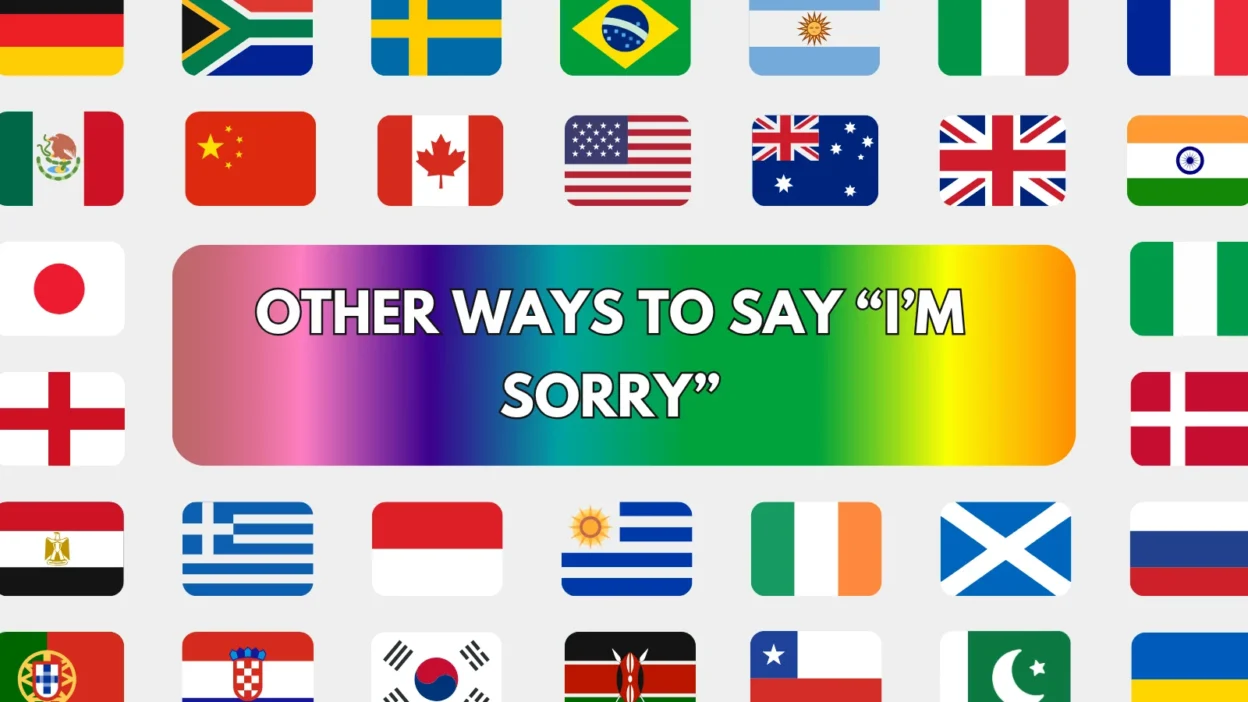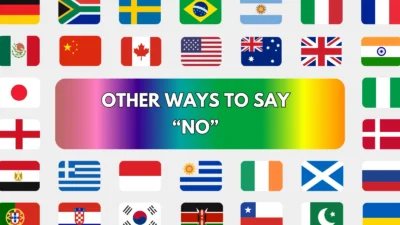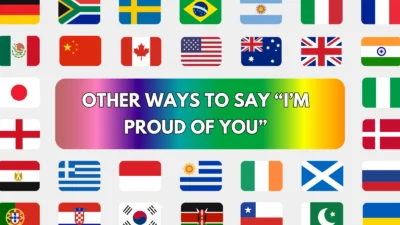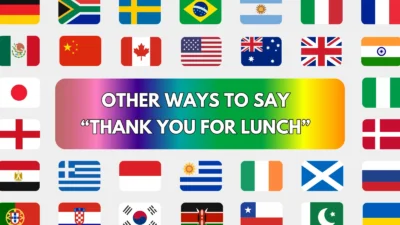The phrase “I’m sorry” is one of the most important expressions in any language. It conveys regret, empathy, or an apology for something that’s happened — whether it’s your fault or not. But using the same phrase over and over can lose its emotional weight. That’s why it helps to have different ways to say “I’m sorry,” depending on the tone, context, and seriousness of the situation.
In this article, you’ll find 25 meaningful alternatives to “I’m sorry,” with examples and explanations for how and when to use each one sincerely and effectively.
1. I apologize
Meaning:
A formal and respectful way to admit fault or express regret.
Detailed Explanation:
This phrase is often used in business or official settings, and it sounds more formal than “I’m sorry.”
Scenario Example:
I apologize for the delay in responding to your message.
Best Use:
Professional settings, formal writing.
Tone:
Polite, respectful.
2. My apologies
Meaning:
An expression of regret, often used in a written or slightly formal tone.
Detailed Explanation:
Shorter and softer than “I apologize,” it’s ideal for quick, respectful acknowledgments.
Scenario Example:
My apologies for missing your call earlier.
Best Use:
Emails, customer service, polite conversation.
Tone:
Formal, courteous.
3. I’m truly sorry
Meaning:
A deeper, more heartfelt way to express regret.
Detailed Explanation:
Adding “truly” emphasizes sincerity and emotion, making the apology feel more genuine.
Scenario Example:
I’m truly sorry for the way I spoke to you yesterday.
Best Use:
Personal conversations, emotional moments.
Tone:
Sincere, emotional.
4. I regret that
Meaning:
Expresses a formal or distant sense of remorse.
Detailed Explanation:
Often used in formal writing or when acknowledging unfortunate news or actions.
Scenario Example:
I regret that I won’t be able to attend the meeting.
Best Use:
Business communication, formal messages.
Tone:
Formal, neutral.
5. My bad
Meaning:
A casual, lighthearted way to admit a minor mistake.
Detailed Explanation:
Slang often used among friends or peers when the issue isn’t too serious.
Scenario Example:
Oops, my bad — I sent the wrong file.
Best Use:
Casual conversations, informal texts.
Tone:
Relaxed, informal.
6. I didn’t mean to
Meaning:
A way to express that the harm was unintentional.
Detailed Explanation:
Shows regret for an accident without admitting intentional wrongdoing.
Scenario Example:
I didn’t mean to hurt your feelings. I’m really sorry.
Best Use:
Personal relationships, misunderstandings.
Tone:
Sincere, explanatory.
7. Please forgive me
Meaning:
A humble and direct request for forgiveness.
Detailed Explanation:
This phrase is emotionally open and is best used when someone feels deeply sorry.
Scenario Example:
I know I was wrong. Please forgive me.
Best Use:
Emotional apologies, close relationships.
Tone:
Emotional, pleading.
8. I take full responsibility
Meaning:
A strong, mature admission of fault.
Detailed Explanation:
Shows accountability and ownership of actions, often used in formal contexts.
Scenario Example:
I take full responsibility for the mistake and will make it right.
Best Use:
Professional apologies, leadership.
Tone:
Serious, professional.
9. Pardon me
Meaning:
A polite way to excuse yourself or acknowledge a small error.
Detailed Explanation:
Often used in face-to-face interactions to soften a mistake or interruption.
Scenario Example:
Pardon me, I didn’t realize you were speaking.
Best Use:
Public settings, etiquette.
Tone:
Polite, light.
10. That was wrong of me
Meaning:
Admits fault clearly and personally.
Detailed Explanation:
Shows strong self-awareness and humility, ideal for sincere apologies.
Scenario Example:
That was wrong of me, and I want to make it right.
Best Use:
Apologies to loved ones or peers.
Tone:
Honest, direct.
11. I messed up
Meaning:
A casual way to admit you made a mistake.
Detailed Explanation:
Sincere yet simple — great for informal conversations.
Scenario Example:
I really messed up. I should’ve been more careful.
Best Use:
Friends, teammates, informal apologies.
Tone:
Casual, remorseful.
12. I shouldn’t have done that
Meaning:
Acknowledges regret about a past action.
Detailed Explanation:
Expresses accountability while inviting understanding.
Scenario Example:
I shouldn’t have raised my voice — I was frustrated, but it wasn’t right.
Best Use:
Emotional or relational situations.
Tone:
Reflective, sincere.
13. That was my fault
Meaning:
Admits you caused the issue.
Detailed Explanation:
Straightforward and responsible, it shows you’re not shifting blame.
Scenario Example:
The delay was my fault. I should’ve double-checked.
Best Use:
Workplace, teamwork.
Tone:
Responsible, honest.
14. I feel awful about it
Meaning:
Shows personal emotional distress over the situation.
Detailed Explanation:
Communicates emotional depth and remorse effectively.
Scenario Example:
I feel awful about what happened between us.
Best Use:
Close relationships, sincere talks.
Tone:
Emotional, caring.
15. I didn’t intend for that to happen
Meaning:
Shows that your actions had unintended negative effects.
Detailed Explanation:
Great when you want to express regret without sounding defensive.
Scenario Example:
I didn’t intend for that to happen. I truly am sorry.
Best Use:
Accidents, misunderstandings.
Tone:
Caring, explanatory.
16. Please accept my apology
Meaning:
A respectful, formal way to offer an apology.
Detailed Explanation:
Especially effective in written communication or serious matters.
Scenario Example:
Please accept my apology for any inconvenience caused.
Best Use:
Letters, emails, formal apologies.
Tone:
Respectful, professional.
17. I never meant to hurt you
Meaning:
Expresses deep remorse and clarifies intentions.
Detailed Explanation:
Ideal for sensitive or emotional conversations with someone close.
Scenario Example:
I never meant to hurt you — you mean a lot to me.
Best Use:
Relationships, emotional apologies.
Tone:
Heartfelt, emotional.
18. I owe you an apology
Meaning:
Acknowledges that an apology is overdue or necessary.
Detailed Explanation:
This phrase shows maturity and readiness to own up.
Scenario Example:
I owe you an apology for how I reacted yesterday.
Best Use:
Personal and professional settings.
Tone:
Honest, respectful.
19. I was out of line
Meaning:
Admits inappropriate behavior.
Detailed Explanation:
Useful when apologizing for crossing boundaries or acting inappropriately.
Scenario Example:
I was out of line, and I’m really sorry about what I said.
Best Use:
Serious conversations, accountability moments.
Tone:
Direct, sincere.
20. I’ll make it right
Meaning:
Promises action to correct a mistake.
Detailed Explanation:
Goes beyond apology — shows responsibility and intent to fix the problem.
Scenario Example:
I’ll make it right — let me handle it from here.
Best Use:
Professional or personal situations where action is needed.
Tone:
Responsible, proactive.
21. I was wrong
Meaning:
A humble and honest acknowledgment of fault.
Detailed Explanation:
Clear, concise, and sincere — great for building trust.
Scenario Example:
I was wrong to judge you. I hope you can forgive me.
Best Use:
Relationships, apologies that require humility.
Tone:
Simple, honest.
22. I shouldn’t have said that
Meaning:
Admits regret about something verbal.
Detailed Explanation:
Best used when you’ve spoken harshly or inappropriately.
Scenario Example:
I shouldn’t have said that — it wasn’t fair to you.
Best Use:
Conflict resolution, personal chats.
Tone:
Apologetic, thoughtful.
23. I’ll do better
Meaning:
A promise to improve moving forward.
Detailed Explanation:
This phrase shows growth mindset and forward-thinking after a mistake.
Scenario Example:
I know I slipped up. I’ll do better next time.
Best Use:
Team environments, mentorships.
Tone:
Positive, responsible.
24. I was insensitive
Meaning:
Admits a lack of empathy or awareness.
Detailed Explanation:
A strong, direct way to apologize when you’ve hurt someone emotionally.
Scenario Example:
I was insensitive about your situation — I’m truly sorry.
Best Use:
Emotional awareness, personal growth.
Tone:
Honest, mature.
25. That was inappropriate of me
Meaning:
Acknowledges behavior that crossed a line or social norm.
Detailed Explanation:
Used when apologizing for saying or doing something socially or professionally unacceptable.
Scenario Example:
That was inappropriate of me, and I regret saying it.
Best Use:
Workplace, serious conversations.
Tone:
Formal, respectful.
Conclusion
Saying “I’m sorry” is powerful — but using different expressions depending on the tone and situation makes your message more sincere, appropriate, and human. Whether you’re writing an email, speaking with a friend, or handling a mistake at work, these 25 alternatives help you communicate with real empathy and care.

Hadi Bhatti is a passionate writer and content creator at Saypadia, known for turning complex words, phrases, and internet slang into simple, easy-to-understand explanations. With a strong interest in language, meanings, and digital communication, Hadi focuses on helping readers understand what words really mean in everyday use. His writing style is clear, engaging, and user-focused, making learning both practical and enjoyable.




